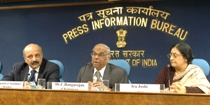India’s growth will be 7.2% says PM’s Economic Council


C. Rangarajan, Chairman, Economic Advisory Council to Prime Minister, addressing a Press Conference on Review of Economy 2009-10, in New Delhi on February 19. Council Member, Dr. Saumitra Chaudhuri and the government spokesperson,Ira Joshi are also seen.
Prime Minister Manmohan Singh’s Economic Advisory Council (EAC) headed by noted economist C Rangarajan is optimistic of India galloping to higher growth rates. It pegs this fiscal’ GDP growth rate at 7.2 percent and forecasts an 8.2 for 2010-11 and 9 percent in 2011-12. Its expectations are based on a turnaround in agriculture sector. There is a word of caution on the inflation front though.
‘We expect a bounce back in agricultural gross domestic product in the next year and the sector will maintain the desired trend growth of 4 percent in 2011-12’, Rangarajan told a news conference in Delhi on Friday after presenting a review of the economic scene to Prime Minister Manmohan Singh. He noted that the present inflationary trends are sugar and food grain (pulses, wheat, and rice in that order) based, both primary and manufactured.
The danger of this spreading to other commodities certainly exists, especially in the backdrop of the strong recovery that the Indian economy has been making since the summer of 2009. So, policy must remain alive to the danger that a significant transfer of food price inflation to the general price level might occur in 2010-11, EAC assessment said.
It advised caution on roll back of the stimuli packages announced to help the Indian economy tide over the global financial meltdown.
According to Rangarajan, the industrial and service sectors will continue to expand strongly. So will be the infrastructure sector which is a priority area for the government. ‘On this basis, we are making an initial estimate that the economy would grow by 8.2 percent in 2010-11 and by 9 percent in 2011-12’, he said.
While on prescriptions, the EAC said, there is no scope for compressing capital expenditures while undertaking fiscal correction. While it is important to reduce the fiscal deficit significantly in the coming budget, the government should safeguard capital expenditures, particularly in the infrastructure sector and also provide adequate viability gap funding.
-
Book Shelf
-
 Book Review
DESTINY OF A DYSFUNCTIONAL NUCLEAR STATE
Book Review
DESTINY OF A DYSFUNCTIONAL NUCLEAR STATE
- Book ReviewChina FO Presser Where is the fountainhead of jihad?
- Book ReviewNews Pak Syndrome bedevils Indo-Bangla ties
- Book Review Understanding Vedic Equality….: Book Review
- Book Review Buddhism Made Easy: Book Review
- Book ReviewNews Elegant Summary Of Krishnamurti’s teachings
- Book Review Review: Perspectives: The Timeless Way of Wisdom
- Book ReviewNews Rituals too a world of Rhythm
- Book Review Marx After Marxism
- Book Review John Updike’s Terrorist – a review
-
-
Recent Top Post
-
 NewsTop Story
What Would “Total Victory” Mean in Gaza?
NewsTop Story
What Would “Total Victory” Mean in Gaza?
-
 CommentariesTop Story
The Occupation of Territory in War
CommentariesTop Story
The Occupation of Territory in War
-
 CommentariesTop Story
Pakistan: Infighting in ruling elite intensifies following shock election result
CommentariesTop Story
Pakistan: Infighting in ruling elite intensifies following shock election result
-
 CommentariesTop Story
Proforma Polls in Pakistan Today
CommentariesTop Story
Proforma Polls in Pakistan Today
-
 CommentariesTop Story
Global South Dithering Away from BRI
CommentariesTop Story
Global South Dithering Away from BRI
-
 News
Meherabad beckons….
News
Meherabad beckons….
-
 CommentariesTop Story
Hong Kong court liquidates failed Chinese property giant
CommentariesTop Story
Hong Kong court liquidates failed Chinese property giant
-
 CommentariesTop Story
China’s stock market fall sounds alarm bells
CommentariesTop Story
China’s stock market fall sounds alarm bells
-
 Commentaries
Middle East: Opportunity for the US
Commentaries
Middle East: Opportunity for the US
-
 Commentaries
India – Maldives Relations Nosedive
Commentaries
India – Maldives Relations Nosedive
-
AdSense code



















